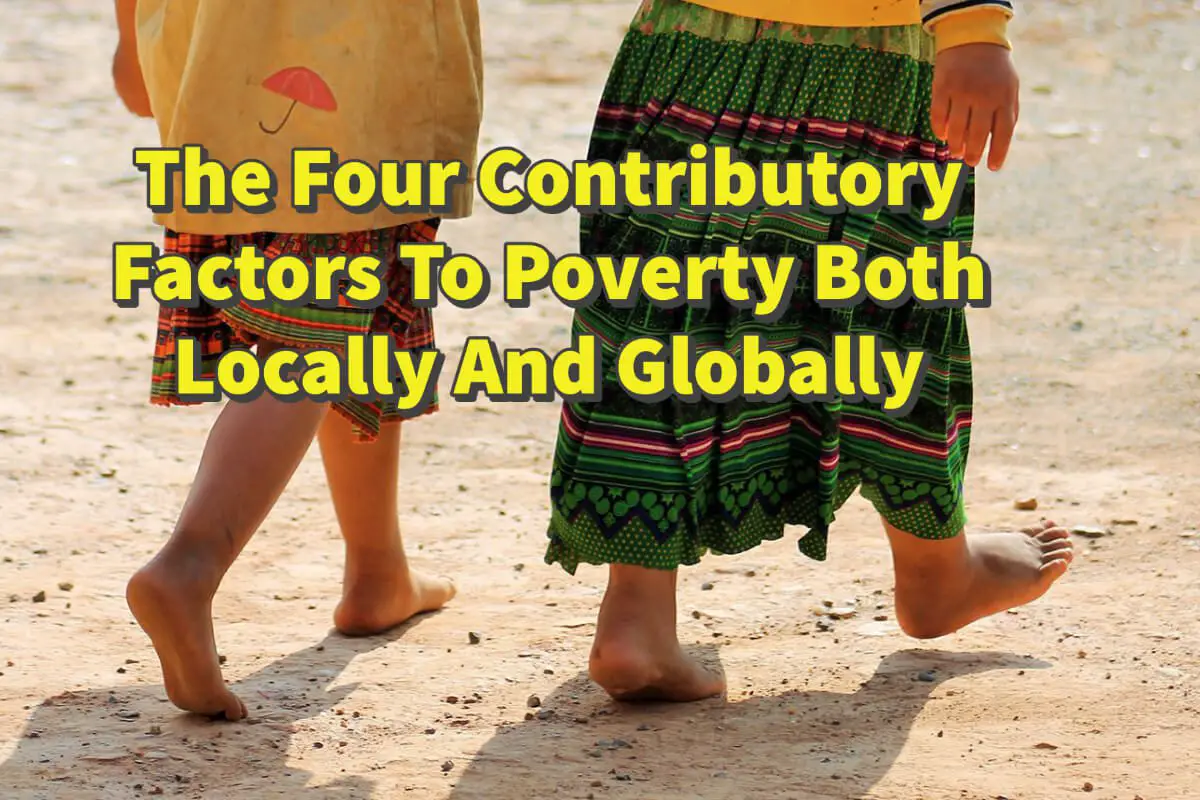Poverty is an issue that affects the entire world. Even those countries considered to be wealthy still have to deal with issues of poverty.
There are four main contributory factors for poverty locally and globally: literacy and education, health and medical care, work or job opportunities, and the overpopulation of a city or country. All of these four areas help to contribute to poverty both locally and globally.
Table of Contents
- Four Key Factors Influencing Poverty at Local and Global Levels
- 12 Reasons Why the Study of Poverty is Essential for Everyone
- References:
- Frequently Asked Questions
- Related Content
Four Key Factors Influencing Poverty at Local and Global Levels
Poverty remains a pressing concern worldwide, transcending national boundaries and economic statuses. Even nations deemed affluent grapple with the complexities of poverty.
This issue can be primarily attributed to four critical factors that impact both local and global scales: literacy and education, health and medical care, employment opportunities, and population density in cities and countries.
Collectively, these elements play a significant role in the perpetuation of poverty, influencing it in various ways at different levels.
Here is how we feel that literacy and education, health and medical care, work or job opportunities, and overpopulation contribute to poverty both locally and globally:
Literacy and Education
Literacy and education go hand-in-hand. This is because poor education or a lack of education is one of the significant causes of poverty globally. The more education a person receives, the more chance they can use their knowledge to escape poverty.
The world is filled with stories of people born and raised in poverty but can escape poverty through education and hard work.
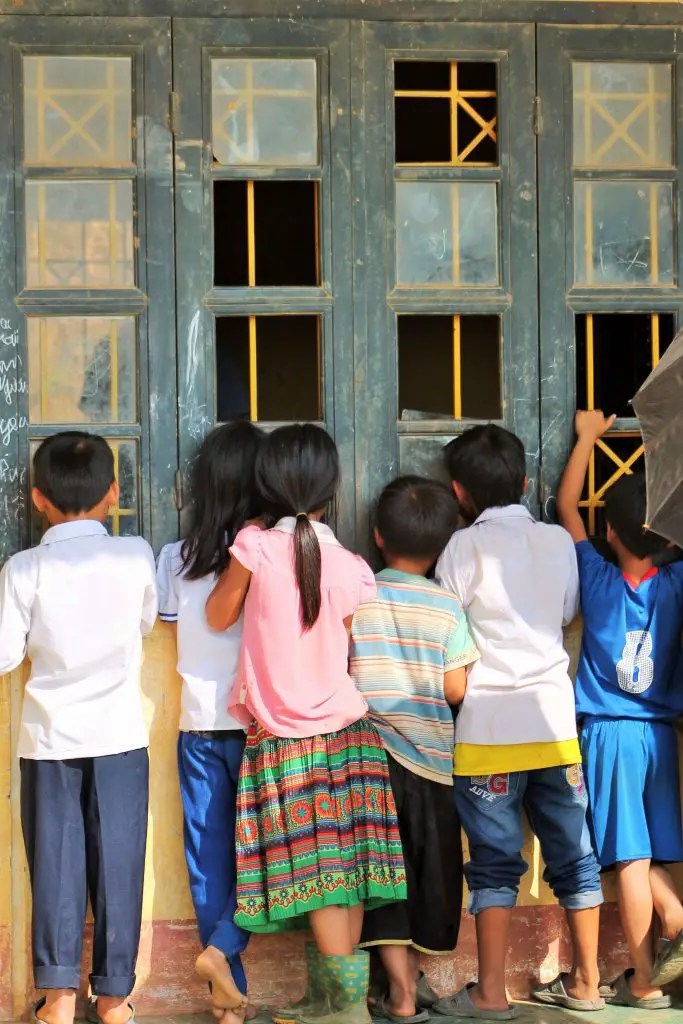
The World Bank and Learning Poverty
The World Bank has termed the concept of education, literacy, and poverty “Learning Poverty.” Learning Poverty is about a child or person obtaining an education.
Learning poverty at the World Bank means:
Literacy Benchmark
All children should be able to read by age 10. Though a person can learn to read later in life, studies have shown that children not reading by age ten usually fail to master reading later in life. This is why the age of 10 is a benchmark for children to be able to read simple text to be considered literate.
Reading is a Gateway
Reading is a gateway for learning; reading is the tool to help a child to be able to learn. If a child cannot read or write, the doors to learning and many job opportunities are shut.
Quality Education
Quality education is essential for all children. It is not just the quantity but the quality of education a child receives. This is why those children whose parents give them a high-quality education will usually continue to do well in life.
Fundamental Skills
The World Bank has found that a large proportion of children around the world are not learning some fundamental skills – which also include reading, writing, math, science, and the humanities.
Children Not In School
Worldwide, it is estimated that 260 million children are not even in school. Without being in school, it hurts the child if they later decide to get an education or when they join the workforce.
In speaking about the concept of learning poverty, the World Bank said:
“To spotlight this crisis, we are introducing the concept of Learning Poverty and an accompanying measure constructed jointly by the World Bank and the UNESCO Institute for Statistics. Learning poverty means being unable to read and understand a simple text by age 10. This indicator brings together schooling and learning indicators: it begins with the share of children who haven’t achieved minimum reading proficiency (as measured in schools) and is adjusted by the proportion of children who are out of school (and are assumed not able to read proficiently).”
The World Bank
Many parts of the world and some cultures do not attach much importance to education. Some countries will only educate boys and not girls. This lack of education for the girls ensures that a girl will be in poverty or dependent upon her husband’ or family’s support her entire life.
Due to economic or other necessities, many families do not see the need for their children to be educated. Some feel once a child is a certain age, they need the children to work to help support the family. With my work with Project Sprout, I have met many of these children – primarily girls -many Hmong – who live in poverty in the mountainsides of Vietnam.
These girls stopped school at ages 7, 8, or 9 – some never attended school. They either need to help care for younger siblings or help their parents in the fields. Most of these girls get married very young, or others are eventually sold into the sex trade.
These parents do not fully understand that by ensuring their daughters or children lack education and literacy, they almost guarantee the family’s cycle of poverty will continue to the next generation.
This is why The World Bank and UNESCO Institute for Statistics have placed high importance on education and learning and are watching this through their learning poverty criteria. They understand that with education and literacy, a person has a much higher chance of escaping poverty than someone uneducated or literate.
Health and Medical Care
Health or ill health and medical care or the lack of medical care is a significant cause of poverty. This is because the cost of seeking proper health care can drive people into poverty. This does not just happen in third-world countries but is also known to happen in many first-world countries.
The out-of-pocket expenses for health, such as consultations, tests, medicine, transportation, and other costs, can drive many people into poverty. On top of the loss of income for those who are ill or have a disease, this can be insurmountable.
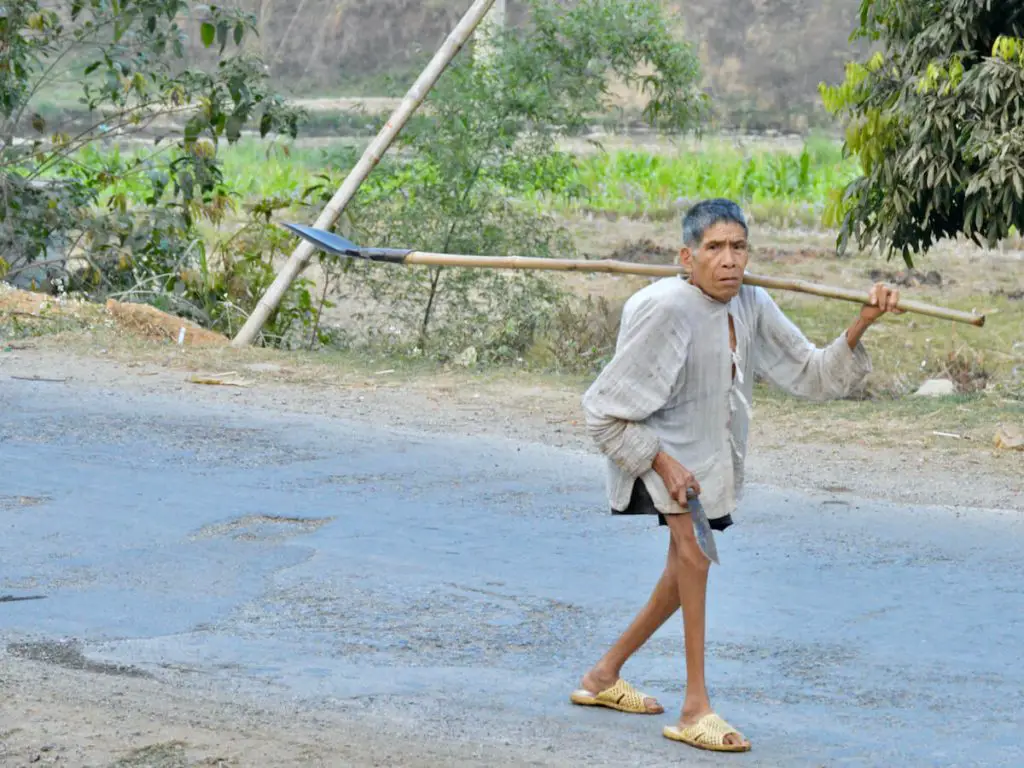
In many developing countries, illness can cause the breadwinner and other family members to stop working or attending school to care for sick relatives. Some people are forced to sell their assets to cover the medical expenses for themselves or a loved one, or they need to borrow money at a very high-interest rate.
In my work with Project Sprouts, I have seen firsthand how devastating they can be to a family when visiting some villages outside Hanoi. I have been in the homes of children who had nothing because their father died of a disease, so the family lost their main breadwinner.
In some cultures, when a woman loses a spouse, it is almost impossible for her to remarry due to social or cultural stigmatism. With the death of a spouse, she is almost guaranteed she will live in poverty.
In speaking of the importance of health care and poverty, the World Bank has said:
“Strong health systems improve the health status of the whole population, but especially of the poor among whom ill health and poor access to health care tends to be concentrated, as well as protect households from the potentially catastrophic effects of out-of-pocket health care costs. In general, poor health is disproportionately concentrated among the poor.”
The World Bank
Many developed countries, including the United States, have seen many people be forced into poverty because of health care expenses. A recent study found that Americans who relied on Medicare for their primary health insurance faced higher medical bills, so they would forego essential health care.
This foregoing of essential health care could lead to more severe medical problems in the future. In other words, in many of the world’s so-called wealthier countries, many people are considered “healthcare poor” because their healthcare bills are so high they cannot afford to get the healthcare help they need.
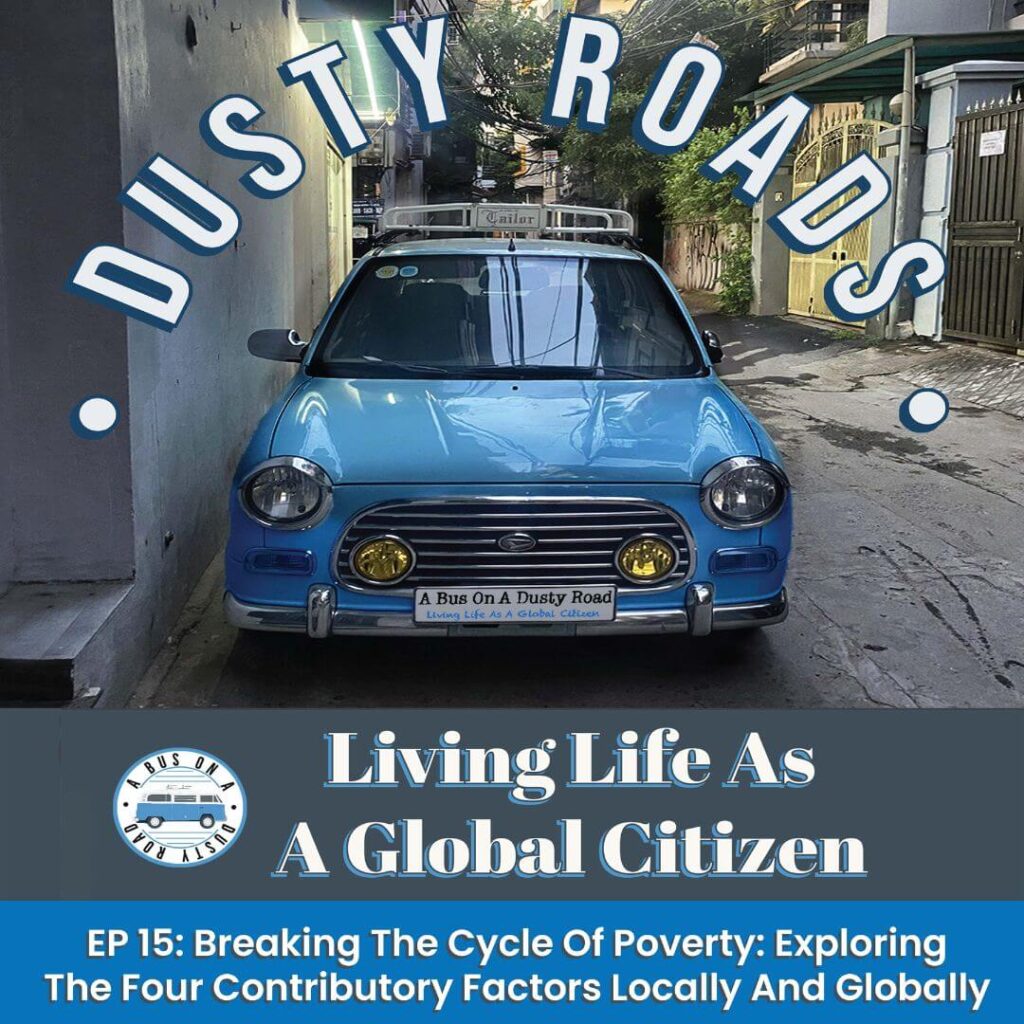
Listen To Our Podcast About Breaking The Cycle Of Poverty: Exploring The Four Contributory Factors Locally And Globally below or by clicking here.
Lack Of Job Opportunities
The lack of job opportunities is also one of the core causes of poverty. For the poor, their labor is usually the only real asset to improve their lives and well-being.
A person who does not have productive employment opportunities will have difficulty getting out of poverty, educating themselves or their children, or improving their social development.

This is why it is so important that people have decent jobs, especially women and younger people. Due to the effects of the COVID-19 pandemic worldwide, fewer women are working than men. Worldwide, this has accounted for 54 million fewer women in the workforce after COVID. Even though COVID is now gone, many effects of the COVID-19 pandemic still linger.
Added to this number of fewer women in the workforce, there is also still the issue of the gender pay gap. It is estimated that women, on average in the United States, will earn anywhere from 18% to 2% less than men for the same work; in other countries, this can be much higher.
The 18% to 2% may not seem high, but this can be a huge difference in reality. This means that a divorced or widowed woman will have a much harder chance of raising her family out of poverty than her husband. Not only did she lose being in a household with two incomes, but now she will also earn about 18% less than a man would for the same work.
Women and underemployed young people may also find it much harder to find a job that will pay them a living wage. These factors contribute to the poverty issue’s lack of job opportunities worldwide.
Population and Pollution
Overpopulation is also one of the main factors that can influence poverty. Overpopulation can also lead to more pollution, which contributes to poverty. Some call these the 3 Ps’ – Population, Pollution, and Poverty.
There are several ways that overpopulation can affect poverty. One is that a country runs out of money, so there are no social or welfare programs. The government cannot care for or support its citizens, and this will then contribute to poverty.
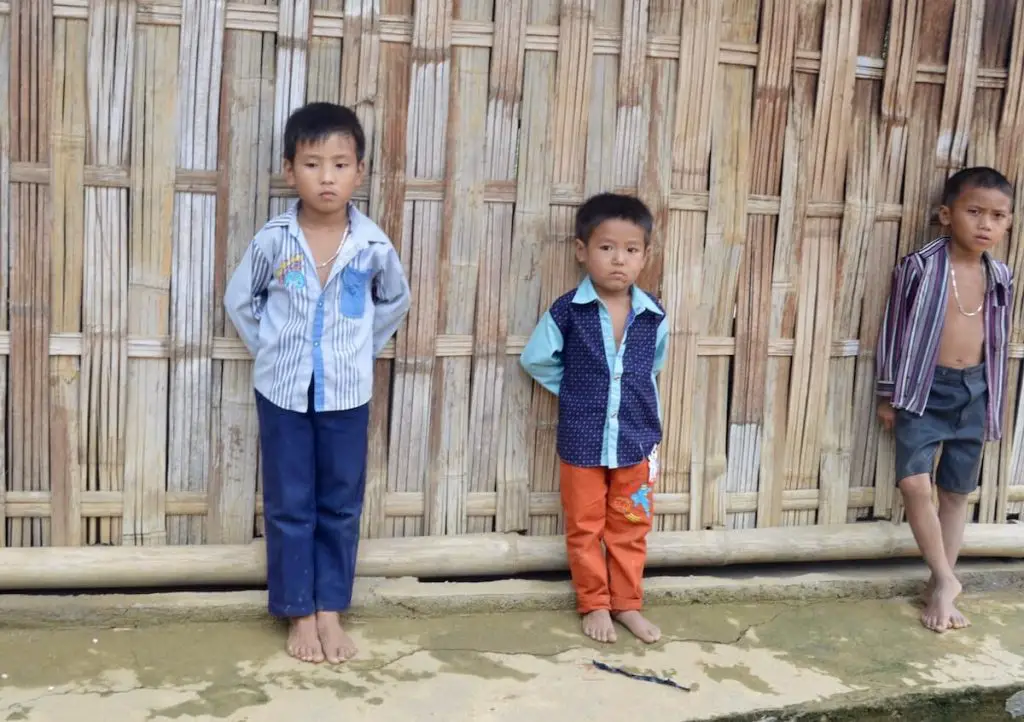
Another is that families have so many children and an underemployed father, and there is not enough money to put food on the table to feed the family. Poverty usually forces older children into child labor; these children must stop their education.
In extreme cases, the parents sell their daughters into the sex trade, ensuring a terrible fate for their daughters that few will ever recover from. Other low-income families have their children leave their country and try to become refugees in another country.
Overpopulation also affects poverty and pollution. Overpopulated cities are so polluted that people suffer from pollution-related diseases; the cost of these diseases is driving families into poverty.
The fishermen can no longer fish in the polluted waters, so they have no way to support and feed their families. Farmers that no longer extend farm in their fields because their fields are too polluted with plastic and other things
Add to that the world areas where populations are growing much faster than the food supply. This lack of food will increase prices and contribute to poverty and hunger.
There are no straightforward answers to all these poverty problems as these problems are very complex. The answers depend upon many outside factors such as government, social services, culture, and individuals.
This is why poverty has no one easy fix, making poverty a complex worldwide issue to solve.
But there are things that we as individuals can do. If we find ourselves in a poverty situation, we can work to get all the education we can; there is so much that can be learned today on the internet.
If we are lucky and have money, we can seek out programs and people actively working in one or all of these areas and financially support their work. We work with Project Sprouts, a grassroots organization in Hanoi, Vietnam. Our primary focus is to help poor students and schools in North Vietnam.
Finally, if you are traveling to a country where poverty is an issue, it is essential to understand how poverty affects people. Tossing a plastic water bottle on the ground may not affect you personally, but it could affect someone else. Be sensitive to those who do not have a lot and understand that living in poverty probably has more to do with circumstances than anything else.
12 Reasons Why the Study of Poverty is Essential for Everyone
Understanding poverty is not just a subject for policymakers, sociologists, or activists. It’s a topic that has far-reaching implications for everyone, irrespective of where they live or what they do.
Here are 12 compelling reasons why every individual should seek to understand poverty:
- Universal Human Empathy: At our core, we are all human beings with emotions, aspirations, and needs. Studying poverty helps us cultivate empathy and compassion for those who live in challenging conditions, promoting a more inclusive and understanding society.
- Economic Benefits: Economies thrive when all segments of the population are empowered. Addressing poverty means tapping into a vast pool of human potential, leading to more productive societies and stronger economies.
- Promotes Global Stability: High levels of poverty often correlate with social unrest, conflict, and migration. Understanding and addressing the root causes of poverty can enable local and global peace and stability.
- Encourages Sustainable Solutions: The study of poverty pushes us to seek sustainable, long-term solutions to global challenges rather than short-term fixes.
- Better Policymaking: When more people understand poverty, they can influence their leaders to make informed policy decisions that directly address the needs of the vulnerable.
- Broadens Worldview: Studying poverty gives a comprehensive understanding of global dynamics, leading to a more educated, informed, and interconnected global community.
- Promotes Innovation: Addressing the challenges of poverty often requires out-of-the-box solutions. This drive towards innovation can yield results that benefit everyone, not just those living in poverty.
- Personal Growth: Engaging with the reality of poverty can foster personal growth, leading to a life lived with greater purpose, gratitude, and commitment to positive change.
- Enhances Cross-cultural Understanding: Poverty is a global issue with diverse cultural and regional dimensions. By studying it, individuals gain insights into different cultures and ways of life, fostering mutual respect.
- Connection to Other Global Issues: Poverty is intertwined with other global issues like climate change, healthcare, education, and gender equality. Understanding poverty can provide insights into these related challenges.
- Boosts Volunteerism and Philanthropy: Awareness of poverty often leads to a personal drive to make a difference, whether through volunteering, donating, or other means.
- Ensures Future Preparedness: As our world evolves, challenges like resource scarcity, population growth, and economic shifts will emerge. A deep understanding of poverty equips us to navigate these challenges better, ensuring a brighter future for all.
Understanding poverty isn’t just about facts and figures. It’s about seeing the world through a broader lens, recognizing our shared humanity, and realizing that every person’s well-being is interconnected. It’s a study that enriches our lives, enlightens our decisions, and empowers our actions for a better world.
At A Bus On A Dusty Road, we discuss history, travel, life, sailing, and ex-pat living. We are all about “Living Life As A Global Citizen.” We explore social, cultural, and economic issues and travel.
We would love to have you be part of our community. Sign up for our newsletter to keep up-to-date by clicking here. If you have any questions, please contact me, Anita, by clicking here.
Listen to our Podcast called Dusty Roads. You can find it on all major podcast platforms. Try out listening to one of our podcasts by clicking here.
Subscribe to our A Bus On A Dusty Road YouTube Channel filled with great videos and information.
References:
What is learning poverty? The World Bank
Poverty and Health, The World Bank
Fewer women than men will regain employment during the COVID-19 recovery, ILO, International Labour Organization.
How population and poverty are linked, Financial Times.
Frequently Asked Questions
What is the impact of literacy and education on poverty?
Literacy and education play a crucial role in combating poverty. Providing individuals with knowledge and skills can improve their employment prospects, access better-paying jobs, and break the cycle of poverty.
How does health and medical care contribute to poverty?
Inadequate access to quality healthcare and medical services can lead to increased medical expenses and productivity losses, pushing individuals and families into poverty. Without proper healthcare, people may struggle to stay healthy, work effectively, and escape poverty traps.
How do work or job opportunities influence poverty?
Limited work or job opportunities contribute to poverty by reducing individuals’ ability to earn a sufficient income. Lack of decent employment options can lead to low wages, underemployment, and unstable income, all of which can perpetuate poverty.
How does overpopulation impact poverty?
Overpopulation can strain a city or country’s available resources and infrastructure, making it challenging to provide adequate healthcare, education, and job opportunities. This strain exacerbates poverty, significantly when the population growth outpaces economic development.
What are some solutions to address literacy and education-related poverty?
Effective solutions include improving access to quality education, promoting adult literacy programs, investing in vocational training, and reducing barriers to education, such as gender disparities and financial constraints.
How can healthcare and medical care be improved to alleviate poverty?
Enhancing healthcare systems, increasing access to affordable healthcare services, implementing health insurance schemes, and prioritizing preventive care can all contribute to reducing poverty associated with health issues.
What strategies can be adopted to create more job opportunities and reduce poverty?
Strategies include fostering economic growth, supporting entrepreneurship and small businesses, promoting skills development, attracting investments, and implementing job creation programs.
How can overpopulation be addressed to combat poverty?
Addressing overpopulation requires a comprehensive approach, including family planning initiatives, educating communities about the benefits of smaller family sizes, and investing in sustainable development practices to meet the needs of a growing population.
Related Content
Life Lessons about Love and Sacrifice from Manufacturing in Asia
As I watched these men and women factory workers manufacturing products for export, I reflected on how their work sacrifice was an act of love. They were willing to sacrifice whatever they had to help provide for their families. These factory laborers understood that sacrifice is love, and true love must include some form of sacrifice. They taught me more about giving love in that true love freely knows no bounds.
To discover more, read Life Lessons about Love and Sacrifice from Manufacturing in Asia by clicking here.
6 Lessons On Community Support from The Mongolian Nomadic Herders
The Mongolian nomadic herders in the Gobi Desert taught me six important lessons about our community support importance. I learned some important lessons about working together as a group and supporting our neighbors while building a support team that will always be there for us – especially in our time of need. For this to happen, we must each be willing to serve in our communities and work together.
To discover more, read 6 Lessons On Community Support from The Mongolian Nomadic Herders by clicking here.
What Was The Main Reason For US Involvement In Vietnam?
The main reason for the involvement of the United States in the Vietnam War was the belief in the Domino theory; the Domino theory was a principle used to describe the effects on the world if Vietnam fell to communism. The belief was that if Vietnam became communist, the rest of Asia, New Zealand, and Australia would eventually become communist. At the time, American leaders felt they were fighting for the survival of democracy worldwide.
By clicking here, you can learn more by reading What Was The Main Reason For U.S. Involvement In Vietnam?

